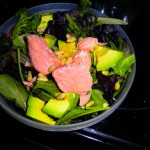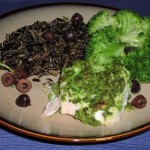February is American Heart Month, so I’m spotlighting one of the best foods for heart health, fish which happens to be naturally gluten-free. I’ve also got some gluten-free resources that I love below, too.
Every week or so, I see an article on the importance of fish for good health and how we all should eat more. Then a line or two on how people should avoid mercury because it can be so dangerous, etc. I suspect the take-home message most people are receiving is “you should eat fish, but it’s risky.”
So let’s break it down and make it easy. The American Heart Association recommends 2 or more servings of fish a week, preferably fatty fish, like salmon, mackerel, herring, lake trout, sardines, etc. Aside from heart disease, there are so many reasons why fish can be beneficial–omega 3 fatty acids are anti-inflammatory and may help with conditions from high triglycerides, rheumatoid arthritis, macular eye degeneration, high blood pressure, depression and the list just goes on.
Studies show that while mercury, PCBs, etc. are associated with health risks, the risks of NOT eating fish are higher. In other words, the potential benefits outweigh the risk.
Fortunately, a lot of the highest omega 3 fish are low in mercury, too.
Steer clear, or limit the big fish…they’ve accumulated a lot of mercury as they’ve eaten up the little fishies.
- Shark
- King Mackerel
- Tilefish
- Swordfish
For pregnant, breastfeeding moms and little ones, those listed above should all be off the table.
Tuna is also moderately high in mercury, especially albacore tuna. We’re best to limit tuna to 6 oz a week, or if you’re  eating canned, choosing a lower mercury variety like skipjack tuna is wise. For all you sushi aficionados, the much of the tuna used tends to come from larger fish, which are higher in mercury. Or just trade in your tuna for canned salmon, which is usually wild-caught, higher in omega 3s and lower in mercury.
eating canned, choosing a lower mercury variety like skipjack tuna is wise. For all you sushi aficionados, the much of the tuna used tends to come from larger fish, which are higher in mercury. Or just trade in your tuna for canned salmon, which is usually wild-caught, higher in omega 3s and lower in mercury.
My favorite new resource puts the info on omegas and mercury together nicely, so you can see how your favorite fish stacks up. Or, if you want to calculate your mercury level for a week and see how you’re doing, check out a nifty calculator from GotMercury.org You can crunch the numbers based on what you’re eating and your size, and that can give you a good sense of where you stand in relation to the recommended limit. Or you can check out the FDA listing of mercury in fish.
What about sustainability and the environment, the politics and health of wild/vs. farmed, etc.? That’s a whole different discussion! The short answer is to check out a seafood guide, such as the one from the Monterey Bay Aquarium.
What about that flaxseed you’re adding to your yogurt faithfully every day? That has omega 3s, too, as does walnuts, canola oil, soy, chia seed and more. This form of omega 3s, called ALA, does have health benefits. However, it does not seem to have all of the same benefits as the omegas in fish, and our bodies don’t use it as efficiently. If you’re vegan or allergic to fish? There are DHA supplements available that are derived from algae.
Speaking of supplements, generally, a low dose (around 1 gram) is generally considered safe, but definitely don’t go for high dose supplements (over 3 grams) without having a chat with your doctor.
A few of my favorite things:
I often am asked about my favorite books, products, etc. And so here’s a run-down of a my 3 favorite cookbooks for 2012:
- The Everything Gluten-Free Slow Cooker Cookbook by Carrie Forbes review here
Quick, simple, fix it and forget it meals. Everything I’ve made has been fantastic.
Veggie-heavy, whole-foods meals for the whole family. Lots of great ideas, and I’m jut about to make the sauerkraut!
- The Gluten-Free Almond Flour Cookbook by Elana Amsterdam
A fantastic book. Almonds are one of my favorite “go-to” foods for snacking and also for baking.
Some things I’m loving:
This moving NYT story about a boy with Juvenile arthritis. His family tried dietary changes, and it seems like they made a huge difference for him. Please note—I don’t believe in pushing a g-free diet as the cure for all ills, and yet I absolutely get regular feedback that there are people who do see amazing benefits, even without Celiac.

My favorite Valentine’s day recipes:
- Tuxedoed Strawberries
- E’s Cake
- Chocolate Covered Pomegranates
- For a quick and easy treat, how about a Crust-less Gluten-free Pie from Shirley of Gluten-Free Easily?
What can I say, I like chocolate.
Upcoming DC Events:
Meeting Date: Saturday, March 2, 2012, 2:00–4:00 pm
Speakers: Andy Williams, from Barlean’s Organic Oils
Karen Broussard, the creator of the GlutenFreeTravelSite, , will introduce and conduct a live website demonstration of her acclaimed website and many of its brand new features.
Location: Bethesda Public Library
7400 Arlington Rd., Bethesda, MD 20814
www6.montgomerycountymd.gov/Apps/Libraries/branchinfo/be.asp
Cheryl Harris, MPH, RD is a Registered Dietitian, Nutritionist and Certified WellCoach in Fairfax & Alexandria, VA. Cheryl works with people to feel and look their best with a range of specialties, including Celiac Disease, food allergies, pregnancy, breastfeeding, vegetarian and vegan diets, preventing diseases and “whole foods” eating.
Let’s get you on your way to achieving your goals. Email me or call 571-271-8742.


Right now it appears like Drupal is the preferred blogging platform out there right
now. (from what I’ve read) Is that what you are using on your blog?